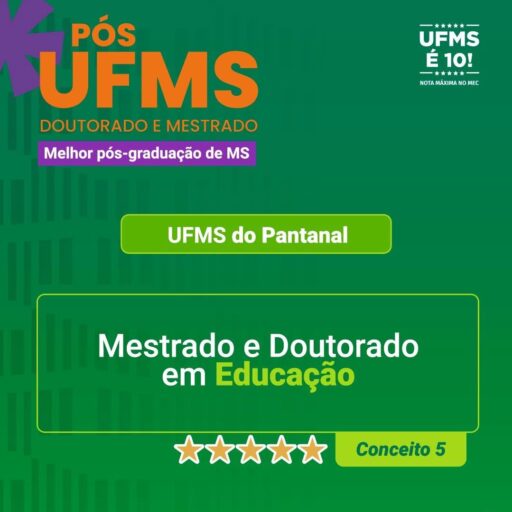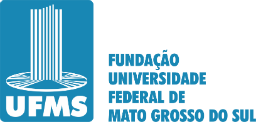ELIANE DA SILVA DAMASCENO – O Programa Mais Alfabetização na visão de professoras alfabetizadoras de uma escola da Rede Municipal de ensino de Corumbá-MS
RESUMO
Esta dissertação está inserida na linha de Pesquisa “Práticas educativas, formação de professores(as)/educadores(as) em espaços escolares e não escolares” do Programa de Pós-graduação em Educação (PPGE) do Câmpus do Pantanal (CPAN), da Universidade Federal de Mato Grosso do Sul (UFMS), área de Concentração em Educação Social. O conteúdo parte do pressuposto de que a apropriação da leitura e da escrita é essencial na sociedade contemporânea e influencia a vida cotidiana das pessoas, sendo necessário garantir o processo alfabetizador da criança e também a formação dos(as) professores(as) que atuam nos Anos Iniciais do Ensino Fundamental. Tem-se como problema a descontinuidade nas políticas de formação de alfabetizadores, e, como objeto de estudo, o Programa Mais Alfabetização (PMALFA), para obter as respostas de tais questionamentos: como o PMALFA foi desenvolvido na Rede Municipal de ensino de Corumbá? Quantas escolas foram contempladas? Qual a avaliação dos(as) professores(as) envolvidos(as) com relação ao desenvolvimento do Programa na escola? Para responder tais questões, a presente pesquisa teve como objetivo geral compreender a visão de professoras alfabetizadoras da Rede Municipal de ensino de Corumbá-MS sobre o PMALFA, desenvolvido em 2018 e 2019 em sua escola. Como objetivos específicos o que segue: a) Levantar o histórico do PMALFA, do cenário nacional ao local (Corumbá); b) Mapear o número de escolas, de professores alfabetizadores e assistentes que aderiram e atuaram no PMALFA nos anos de 2018 e 2019 na Rede Municipal de ensino de Corumbá- MS; c) Refletir sobre a visão das professoras quanto ao desenvolvimento cotidiano do Programa bem como os seus efeitos em uma das escolas atendidas. Com abordagem qualitativa quanto à natureza do estudo, exploratória e descritiva, em relação aos objetivos, a investigação também configura-se como estudo de caso, com a triangulação das seguintes fontes e instrumentos: (i) Documentos norteadores do PMALFA para análise do Manual Operacional do Sistema de Orientação Pedagógica e Monitoramento e da Portaria que institui o PMALFA; (ii) Dados da Secretaria Municipal de ensino de Educação de Corumbá (Semed-Corumbá) por meio de questionário respondido pela técnica responsável pelo e (iii) depoimentos de cinco professoras alfabetizadoras a partir da realização de entrevistas. As análises centraram-se no desenvolvimento cotidiano e nos efeitos do programa, indicando as seguintes dificuldades: ausência de formação continuada; falta de estrutura metodológica e tempo para desenvolver um trabalho sistematizado e colaborativo. Outro aspecto refere-se à visão restrita de alfabetização apresentada no documento o qual evidencia a necessidade de conhecimentos pedagógicos inerentes a alfabetização. Conclui-se, portanto, a necessidade de que ações como as do Programa analisado neste estudo tenham como foco a formação de professores(as) pautada na reflexão das demandas presentes no cotidiano escolar.
ABSTRACT
This dissertation is part of the research line “Educational practices, training of teachers/educators in school and non-school spaces” of the Master’s in Education course of the Graduate Program in Education of the Pantanal Campus, Mato Grosso do Sul Federal University, Concentration area in Social Education. It assumes that the appropriation of reading and writing is essential in contemporary society and influences people’s daily lives, being necessary to ensure the child’s literacy process and the training of teachers who work in the Early Years of Elementary School. It has as its problem the discontinuity in literacy teachers’ training policies. To this end, the More Literacy Program was taken as the object of study as it was developed in the city of Corumbá between 2018 and 2019, seeking to answer the following central question: what is the impact of the More Literacy Program on the participant teachers’ view? Thus, in this study, we tried to give a voice to teachers when we tried to answer the following questions: how was the More Literacy Program developed in the municipal public education system of Corumbá? How many schools were covered? What is the involved teachers’ evaluation in relation to the development of the program at the school? To answer these questions, the present research had as general objective to understand the literacy teachers’ vision about the impact of More Literacy Program on their training and literacy practices at a municipal public education system school of Corumbá-MS. The specific objectives sought to: a) Raise the history of More Literacy Program from the national scene to the local (Corumbá). b) Map the number of schools and teachers, teachers and assistant teachers who joined and worked in the More Literacy Program in 2018 and 2019 in the municipal public education system of Corumbá-MS. c) Reflect the teachers’ vision regarding the program daily development, as well as its effects on one of the schools served. With a qualitative approach regarding the nature of the study and exploratory and descriptive in relation to the objectives, it is also configured as a case study, with the triangulation of the following sources and instruments: (i) guiding documents of the More Literacy Program for analysis of the Pedagogical Guidance and Monitoring System Operational Manual and the Ordinance establishing the More Literacy Program; (ii) data from the Municipal Education Secretary of Corumbá through a questionnaire answered by the responsible technician for the program; and (iii) testimonies of five literacy teachers based on interviews. The analyzes focused on the daily development and on the effects of the program, indicating as impacts: the absence of continuing education, lack of methodological structure and time to develop systematized and collaborative work. Another aspect refers to the restricted view of literacy presented in the document, which highlights the need for pedagogical knowledge inherent to literacy. Therefore, it is concluded that actions such as the analyzed program in this study need to focus on the training of teachers based on the reflection of the demands present in everyday school life.


